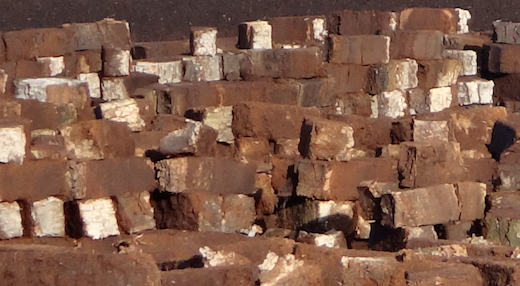IPCC’s anti-moss peat campaign is based on the threat posed to our raised bogs by the harvesting of a variety of horticultural products from raised bogs including sod moss and moss peat. People entering a garden centre intent on creating a beautiful garden in their home rarely think about the products that they buy and the impact they can have on the natural world and the environment. Professional horticulturalists and growers insist that they need peat as it is a uniform product that they can work with to create precise growing media.
Irish raised bogs are rich in Sphagnum mosses, the bog building plants. With time these are laid down in the accumulating bog as moss peat soil which can be up to 6m deep. There are up to 50 companies mining moss peat from raised bogs in Ireland with little regard for the environmental damage including loss of habitat and release of green house gases. The material is sold as compost in garden centres and exported world wide to professional horticulturalists.

Blocks of sod moss cut from a raised bog in Kildare for export. If you see this product anywhere in your travels through Ireland please submit information to IPCC here. Photo: IPCC
- Home composting using organic kitchen and garden waste provides an ideal soil conditioner and potting medium – there is no need to use moss peat. There are different ways to make compost. Follow this link to choose what suits you.
- Home composting stops organic waste from going to landfill and the cost associated with its disposal.
- There are many alternatives available to moss peat in gardening and professional horticulture such as coir, bark, shredded wood fibre, green waste, leaf mould, worm compost, brewers barley compost, bracken compost and farmyard manure – once again no need to use moss peat. Follow this link for more information.
- Over 60ha of new raised bog habitat have been damaged by drainage for moss peat products since 2014 that the Irish Peatland Conservation Council are aware of and there are numerous sites in production for many years.
- The National Peatland Strategy of Ireland called for a review of the use of moss peat in gardening products in 2015 but no action has been taken to date
- IPCC mounted a petition on this issue. 531 supporters added their voice to ours in the call to ban the sale of moss peat in gardens and its production from raised bogs.
The use of moss peat in gardening in Ireland is very strong. There is no need to purchase this product which comes from raised bogs that are facing extinction as they are drained and mined for this product. The impact on the biodiversity of the bog is obvious as it is removed and equally the impact on the long term carbon store of the bog is huge. The use of moss peat in gardening is directly contributing to global warming and biodiversity loss. Choose wisely in the garden centre, make sure the bags you buy are PEAT-FREE.
Take Action
-
- Submit observations you have made on a sod moss site here.
- Learn about composting here
- Buy Peat Free Compost compost in the garden centre
- Watch the home composting DIY video
Thank You
IPCC’s anti-moss peat campaign is supported by The IEN and Patagonia/Tides Foundation
Text, Photographs and Images © Irish Peatland Conservation Council, Bog of Allen Nature Centre, Lullymore, Rathangan, Co. Kildare, R51V293. Email: bogs@ipcc.ie; Tel: +353-45-860133.
